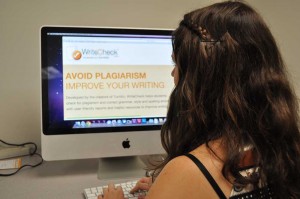Credibility of Turnitin questioned
In the never-ending war on plagiarism, higher education experts have raised new concerns over the credibility of Turnitin after its parent company launched WriteCheck, which allows students to check for plagiarism for a small fee.

Plagiarism · WriteCheck aims to help students recognize plagiarism and avoid grammatical errors. Critics argue, however, that the website allows students to avoid getting caught for plagiarism before submitting a paper. - Photo illustration by Mindy Curtis | Daily Trojan
With the advent of WriteCheck in 2009, college professors nationwide have recently raised complaints that errant students now have a tool to circumvent popular plagiarism detection software.
Faculty at USC began using Turnitin in fall 2008 to identify plagiarism in large classes. At USC, more than 100 documented cases of plagiarism were reported during the 2010-11 academic year, according to Student Judicial Affairs.
Originally released in 1996, Turnitin detects plagiarism by checking submissions against a database of millions of archived papers, journals, periodicals and books.
In an article last week in The Chronicle of Higher Education David E. Harrington, professor at Kenyon College, however, raised the issue that over-reliance on artificial means of detecting plagiarism like Turnitin could lead to some clear violations going unnoticed.
Elinor Accampo, a USC history professor, uses multiple means — in addition to Turnitin — to discourage and to detect plagiarism.
“I make it really clear that, if a student violates academic integrity in any way, they get an F in the course,” Accampo said.
Accampo also said she creates assignments she believes are difficult or impossible to copy from somewhere else and watches out for “red flags,” such as discrepancies between in-class and out-of-class writing.
Most professors and students agree Turnitin discourages students from plagiarizing.
“When students use Turnitin, they know they have a higher chance of being caught so they aren’t going to pull from wikipedia or something,” said Moriah Burton, a senior majoring in film and television production. “They know that the website will know what Wikipedia says and they’re going to get caught.”
The last plagiarism case Accampo saw dealt with a student she caught “very easily” thanks to Turnitin. Though, he is aware of the program’s limitations, Accampo acknowledged it is almost impossible to get away with plagiarizing from works already within Turnitin’s database.
“The work that a student would have to do to get around Turnitin would make it his or her own paper anyway,” Accampo said.
WriteCheck, however, provides a student with complete, advanced access to the same database used by Turnitin for $7 per paper.
“WriteCheck helps students check for plagiarism and correct grammar, style and spelling errors with user-friendly reports and helpful resources to improve writing,” according to its website.
Some students, however, said they would not use WriteCheck because it is not academically honest.
“I do find [WriteCheck] unethical,” said Graham Higgins, a junior majoring in film production. “I wouldn’t want anything to do with it.”
Many students, however, have never heard of WriteCheck.
“If knowledge of WriteCheck were more widespread,” said Holly Morris, a senior majoring in neuroscience. “I’m sure people would use it.”
Other students said Turnitin does not know everything and can accidentally accuse honest students of cheating if they have writing styles similar to that of their sources.
James Collins II, a professor of classics, said that instructors and students should not rely on technology to detect plagiarism.
“I don’t think embracing technology like Turnitin is going to solve the problem,” Collins said. “I would encourage more open dialogue about integrity and honor.”

Turnitin is a joke. It’s so easy to work around their pattern algorithms it’s not even funny.